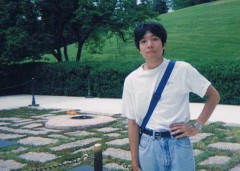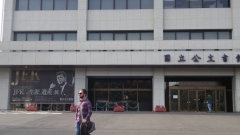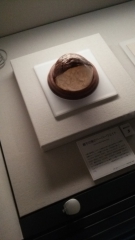24 August 2015
German film "John Rabe" Never been shown in Japanese theatres
I bought a DVD of it. It was released in Germany and China, 2009. Until now it was never released in Japanese theatres. Only shown at one-time meeting by peace activist meeting or symposium. DVD version was released, which individuals purchase on internet.
The drama is based on real events and people involved in Nanjing, China, capital of Republic of China, December 1937.
John Rabe, a German businessman who worked for Siemens decided to be a leader of foreign nationals' committee that managed Refugee Safety Zone in Nanjing, that was about to be occupied by Japanese imperial army.
Because he was German, it was a better choice. In those days, Japan and Germany were allies.
Together with Rabe, some American men and women were in the comittee. They were eager to save Chinese people.
After Japanese army occupied Nanjing, its soldiers did terrible things to Chinese citizens such as theft, arson, rape and even murders.
They tried to help Chinese as barricades to keep soldiers out of Safety Zone. Because they were western civilians from countries neutral from China-Japan war, Japanese soldiers could not hurt them.
Rabe took notes of the events in his diary. The film was mailny based on his diary.
What Rabe and his comittee people experienced is what is known as "Rape of Nanjing." It is estimated 100000 to 300000 people were mass-murdered by Japanese army. As the film depicts, Japanese army had a policy of no alive enemy soldiers.
In Japan, the scale of the massacre has been controversial. Mainly because it is politically sensitive. Just like other nations in the world, such historical facts are considered "masohistic."
I became very interested in this massacre since US invasion of Iraq, 2003. How Japanese army proceeded to Nanjing from the coast was pretty-much like how US army proceeded to Baghdad. What happened to the citizens there was very similar.
I went to Nanjing 11 years ago and met survivors of the massacre. Some of them witnessed Japanese soldiers killed their parents in front of them.
2 years after Rape of Nanjing, Rabe's homeland, Nazi-Germany attacked Poland and occupied surrounding nations. Mass-murdered so many innocent citizens, known as "Holocaust."
By changing position, people could be hero or evil. That is human-history. That is human-nature as well.
Good lesson for all the people of the world.
14:11 Posted in China, Deutschland, Film, Japan News, Media, Politics, Society | Permalink | Comments (0) | Tags: history, war
22 April 2015
Dear Fellow Americans, JFK Exhibit is held in Tokyo
I went to the exhibition of John Fitzgerald Kennedy at National Archives of Japan located near the Imperial Palace in Tokyo.
I went there with one old American couple whose young days were when JFK were alive as US President. They told me that the assassination was shocking to them because he was very popular at that time.
The admission was free. It has been held since early March and is scheduled to end May 10, 2015. The description of exhibits are mostly Japanese. So I explained to them what each one of exhibits was about. Actually they knew what they were because those things were very familiar with them already.
I focused on one corner. The exhibits that relate to his relationship with Japan before he became a politician.
A cononut paperweight and a letter to former enemy.
These things come from his war-time experience in Solomon islands, Southern Pacific 1943. JFK was on torpedo patrol boat with his crews at night. The boat was hit by Japanese naval destroyer, Amagiri and sunk. JFK and his men were all thrown out to the sea but they swam to one island. There they met locals. JFK asked them to deliver a coconut which the message of calling for help was written on to the US military corp. Then he and his men were all saved. By that incident JFK was awarded medals.
After the war, JFK made the coconut into paperweight as a memorial. JFK wrote the letter to former captain of the destroyer, Hanami telling him that he wanted to meet the captain because yesterday’s enemy turned today’s friend. Later JFK invited him to his presidential election campaign. The captain could not go to the US but his best friend, Onozaki, who was also a crew of the destroyer went. The photo that Onozaki and JFK together were printed out in newspapers in US that might help JFK win the election.
He might have felt saved by the Japanese military. I speculate that the enemy did not shoot at them though they found them in the sea or even gave them a rescue boat or some way to save their lives?
JFK to me has weird relation. When I was in US two decades ago as a college student, some of my classmates said to me that I look like JFK. I was glad to hear that.
I remember when I went to Arlington cemetery in Washington, I could come to his grave without knowing the route, seemed like he invited me.

He and I have things in common. I am Catholic and have back pain problem from young days still struggling with it some time. He and I are very much interested in civil rights advocacy.
The memorable thing I saw in the exhibit was his speech film on Civil Right Act in relation to Alabama state’s defiance to Federal court order to admit Afro-American students to its state university.
He said,
“We preach freedom around the world, and we mean it, and we cherish our freedom here at home, but are we to say to the world, and much more importantly, to each other that this is the land of the free except for the Negroes; that we have no second-class citizens except Negroes; that we have no class or caste system, no ghettoes, no master race except with respect to Negroes?
Now the time has come for this Nation to fulfill its promise. The events in Birmingham and elsewhere have so increased the cries for equality that no city or State or legislative body can prudently choose to ignore them.
The fires of frustration and discord are burning in every city, North and South, where legal remedies are not at hand. Redress is sought in the streets, in demonstrations, parades, and protests which create tensions and threaten violence and threaten lives.
We face, therefore, a moral crisis as a country and as a people. It cannot be met by repressive police action. It cannot be left to increased demonstrations in the streets. It cannot be quieted by token moves or talk. It is time to act in the Congress, in your State and local legislative body and, above all, in all of our daily lives.”
That speech sounds like current President Mr. Obama’s endorsement on gay marriage.
After a half century, a new type of civil rights movement seems to be on. The same rhetoric are used for both pros and cons. Majorities vs. Minorities. Conservatives vs. Liberals.
Federal protection law to ban discrimination based on sexual orientation and gender identity has been on debate.
Just like that State of Alabama rejected court order to provide marriage licenses to gay couples.
That is why Obama is called, Black Kennedy. He succeeded JFK’s will to protect civil rights.
Interestingly enough, unlike race matter, sexual orientation matter is common worldwide. So America can be a good role model for this issue.
In relation to it, this coming weekend April 25 & 26, 2015, Tokyo celebrates gay pride event in Yoyogi Park that includes street parade. I will actually join it. Last March one ward of Tokyo, Shibuya passed an ordinance that provides partnership certificate to gay couples. The first political accomplishment in Japan’s gay movement.
Japan’s public opinion regarding gay issue has recently changed.
According to the recent poll conducted by Mainichi Newspaper, majority of Japanese support gay rights, especially among younger generation. More people approve of gay marriage than those who oppose it.
Is it due to what has happened recently in the U.S. ?
Good role model. Hope US keep being good role model for us.
Since I think of JFK, there are 3 songs that come up with. The songs released in the year he was assassinated. Did he hear the songs and enjoy them?
One is related to civil rights movement, "Blowing in the wind", one implies coming of Vietnam war, "Green Green." The other implies the oppression I am facing with many other people regarding US policy which current US Ambassador to Japan, Caroline Kennedy (JFK’s daughter) has to deal with.
15:16 Posted in Japan News, Music, Politics, Tokyo Life, US-Japan relationship | Permalink | Comments (0) | Tags: history, jfk, war, homosexuality, gay, lesbian, college days
31 March 2015
Book: Germans living in Japan during the war time
I recently bought and read a very interesting book on Germans living in Japan during 1930's and 40's, when Japan was in war with China and the USA. The Japanese title is "Senjikano-Doitsujintachi." It illustrates very unique history between Japan and Deutchland.
There were estimated over 3000 Germans living in Japan in that period. That is as much as number of Germans living in Japan now.
During that time Japan was allied with Nazi-Germany. But the German law did not apply. So Jews could live safely in Japan. Not only Jews but exiles did like a former judge who convicted Hitler in 1920's. Other European nations were too close to Nazi-Germany so anti-Nazi people escaped to Japan crossing the Russia.
For them, Japan was like a paradise. Japanese respect Germans because Germany was considered a civilized nation that Japan should model after and was indeed the most important ally for Japan.
Nazi influence was already there. Nazis established a branch in Japan, early 1930's. However, in order to arrest anti-Nazi German citizen, they needed to ask Japanese police to do that. The Japanese at that time did not get along with Nazi ideology, expecially anti-Jew stuff.
Japan and Nazi-Germany made a Cultural agreement that bans using Jew-related materials in education. But even in 1940's Heinrich Heine poems were taught in Japanese colleges. No Japanese could not see the difference between Jews and non-Jews.
The wife of Foreign minister of Japan at that time was Jewish German. Japan was reluctant to corporate with Nazis in terms of oppression on Jews.
Not only Jews and anti-Nazi Germans but Germans who had lived in Indonesia which was former Dutch colony came to Japan after they were freed by the Japanese military. Germans in Indonesia were put in internment camp after Germany invaded Netherland. They were welcomed as citizens in an allied nation.
Japanese praised Hitler as a good and powerful allied nation's leader but did not care about details of Nazis policies. The Japanese government at that time corporated with Germany mainly to counter the U.S.
But after Gemany surrendered in May 1945. Their situation was drastically changed. Japanese thought Germany betrayed them. Some were arrested as enemy spies.
I am thinking of writing a fiction novel based on these facts.
Where the story took place is in Karuizawa, Nagano prefecture, highland resort for high-society in 1945. But there were Germans staying to escape from air-raid in ciities.
Some were Jew or anti-Nazi and some are nazi-sympathizers or nazi-officials dispatched from their homeland. They got along with Japanese who welcomed them feeling complicated. Some were very thankful but at the same time not very happy because Japan was allied with Nazis and some thought Japanese were second-class people not being white.
I guess it is going to be very interesting. In order to write a good story, I am now learning Heine's poems. It may be a main topic of the story.
04 May 2014
Film: "The Railway Man" We are all humans
The story based on autobiography of former British military personnel in charge of radio communication, Eric Lomax, who became POW of Imperial Japanese Army in occupied Singapore during the second world war.
Even after the war he suffered from trauma caused by his experience as POW in Thailand where he and his comrades were transported to. Later he found that the interpreter, Nagase in the Japanese army, whom he met at that period was still alive in Thailand and decided to return there.
It was really shocking to see the film and know the facts. British soldiers were used as labour for construction of the railway and tortured by the Japanese army.
The film, itself was well-done however, reaction from Japanese audience seemed not so positive maybe because of portrayal of Japanese army in the film. It was indeed British perspective.
I was impressed by some words in the film.
"Japanese soldiers choose to die rather than being humiliated alive but Britons live to fight. "
"I have lived for this day. If the war did not end, end this (with your sword)."
Those were paraphrasing of what Nagase said when he re-encounter with Lomax and told him how guilty he had felt for what he did.
In the end, both men reconciled and kept good friendship until they both died recently.
We are all humans. We make mistakes. We hate each other but can understand each other. We hurt each other but can help each other.
We can learn from past mistakes and improve ourselves for better future and our decendants.
I think, that's the message from the two men.







